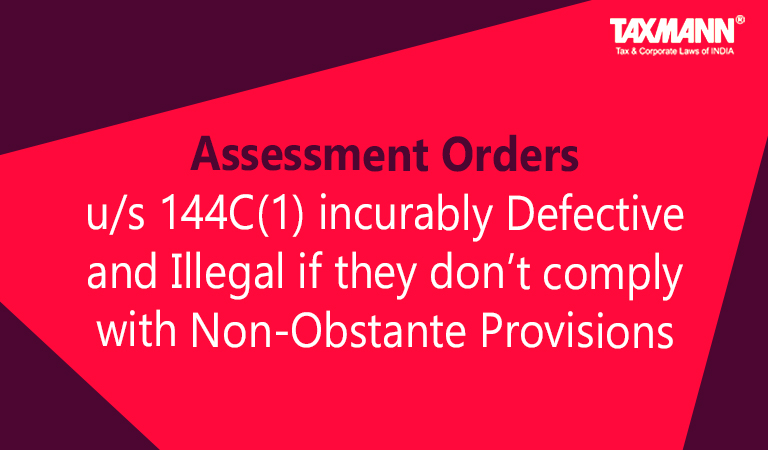Assessment Orders u/s 144C(1) incurably Defective and Illegal if they don’t comply with Non-Obstante Provisions
- News|Blog|Income Tax|
- < 1 minute
- By Taxmann
- |
- Last Updated on 28 September, 2021

Ashutosh Mohan Rastogi, Dhruv Seth & Parash Biswal – [2021] 130 taxmann.com 413 (Article)
The Income-tax Act, 1961 provides for a special and speedier assessment process for a class of assessees termed as ‘eligible assessee’. The section provides that in the first instance the Assessing Officer (‘AO’) shall issue a draft of the proposed order of assessment (colloquially referred to as ‘draft order’) to the eligible assessee. There has been a rise in the number of cases in the recent past wherein AOs have passed the final order without first issuing a draft order and more so in the new environment of faceless assessments.
The Bombay High Court in a recent ruling, allowed assessee’s writ petition and quashed the final e-assessment order, demand notice and penalty notice issued to the assessee as the same was passed without forwarding a draft order mandated by section 144C(1). This article deliberates on the merits of this decision and the potential implications under the newly introduced scheme of faceless assessment scheme.
Click Here To Read The Full Article
Disclaimer: The content/information published on the website is only for general information of the user and shall not be construed as legal advice. While the Taxmann has exercised reasonable efforts to ensure the veracity of information/content published, Taxmann shall be under no liability in any manner whatsoever for incorrect information, if any.

Taxmann Publications has a dedicated in-house Research & Editorial Team. This team consists of a team of Chartered Accountants, Company Secretaries, and Lawyers. This team works under the guidance and supervision of editor-in-chief Mr Rakesh Bhargava.
The Research and Editorial Team is responsible for developing reliable and accurate content for the readers. The team follows the six-sigma approach to achieve the benchmark of zero error in its publications and research platforms. The team ensures that the following publication guidelines are thoroughly followed while developing the content:
- The statutory material is obtained only from the authorized and reliable sources
- All the latest developments in the judicial and legislative fields are covered
- Prepare the analytical write-ups on current, controversial, and important issues to help the readers to understand the concept and its implications
- Every content published by Taxmann is complete, accurate and lucid
- All evidence-based statements are supported with proper reference to Section, Circular No., Notification No. or citations
- The golden rules of grammar, style and consistency are thoroughly followed
- Font and size that’s easy to read and remain consistent across all imprint and digital publications are applied



 CA | CS | CMA
CA | CS | CMA
